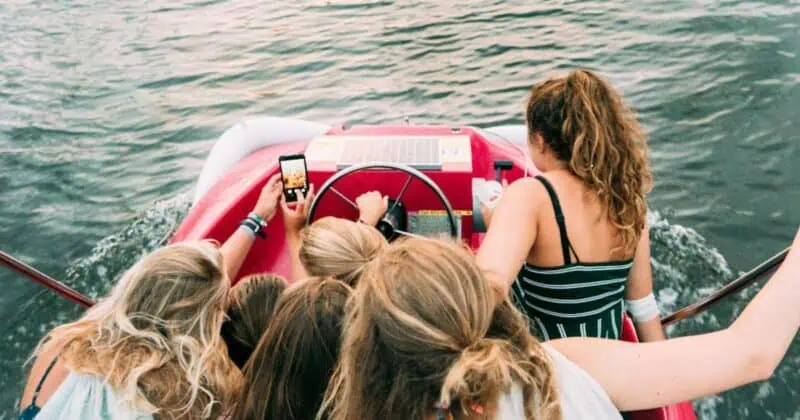No matter how much work you put into designing your tours and dialing down your distribution strategy, it’s the tour guide delivering the experience who can really make or break your tour.
Properly training your tour guides — sometimes called tourist guides or tour directors — is an investment of time and resources. A well-trained and how to hire the best tour guidesexperienced guide can turn your tour into an extraordinary experience for your guests, whereas an undertrained, inexperienced guide can cost you dearly in negative reviews and sometimes worse.

There are myriad aspects to a successful program for training your guides, whether you develop and deliver your training in-house, use a training program developed externally, or some combination.
In this walkthrough, we’ll explore the elements involved in training your guides, from their multifaceted role and the key areas to help them develop from amateurs to experts, to some of the courses and resources available for guiding tours or tourists, finishing with some final tips for operators on training guides, so you can be confident you’re setting your guides up for success.
The Role of a Tour Guide
As anyone who has guided tours surely knows, the job goes far beyond simply being a fact-filled expert. A well-rounded guide is a great storyteller and group leader that often finds themself filling the role of host, educator, entertainer, safety officer, historian, photographer, counselor, navigator, naturalist, customer service representative, parent, friend, and so much more.

The guide fulfills the all-important responsibility of delivering the experience to your guests, and how well they perform that responsibility can have a significant impact on your travel business. For example:
- Impact on Travelers’ Experience: Your tour guides can make or break a traveler’s experience. A well-trained guide knows how to take a tour itinerary and turn it into an extraordinary experience that will feel extra special for each guest, an unforgettable part of their trip they’ll remember forever.
- Impact on Business Reputation: Training your guides to deliver these highly positive experiences will also have a positive impact on your business’ reputation. A positive experience inspires your guests to rave to their family and friends about it in person and on social media, leave five star reviews for your business online, and maybe even come back for more. On the flip side, a negative experience delivered by an inexperienced, undertrained guide can have significant negative implications in the way of customer complaints, negative reviews or worse.
30 September – 3 October 2025
Insider Pro Access Members Save 20%
THE event of the year for solutions-focused In-Destination Experience creators and sellers
Get Your Spring Savings Ticket Today!
Key Areas of Training for Tour Guides
Due to the multifaceted roles your trainees will need to fill to guide tours, it’s important to focus on training for a guide’s holistic development. Location knowledge is of course essential to guide tours in each specific destination, as are any technical skills required for the position.
Additionally, a successful training program will also help guides to not only be great storytellers, but also develop their leadership, communication and interpersonal skills, recognize where their strengths and weaknesses lie, become more confident in their role as a guide and help them take steps towards personal and professional growth. And finally, your guides need an understanding of first aid and safety protocols, and how to respond to problems and emergencies that may arise.

Knowledge, Expertise & Storytelling
Knowledge of your destination, such as local history, culture, and geography, is essential information for your guides. Some tours may also require sector-specific knowledge, such as culinary culture and gastronomy for food tours, ecology and wildlife for nature-based tours, or the legends of local hauntings for ghost tours.
Beyond the knowledge itself, how that information is shared is what makes the difference between a mediocre tour and a memorable experience. A well-trained tour guide will do far more than simply share facts: they will be able to transform their knowledge into engaging stories that make your guests feel something — stories that make them laugh… or cry. Stories that involve conflict and overcoming. Stories that surprise, entertain, inspire and delight. Stories with a personal connection.
Your training program, then, should help your guides develop their storytelling and presentation skills. Expose your guides to successful storytelling — your seasoned guides are a great resource for this — and give them ample opportunity to practice their own storytelling in front of groups, with plenty of feedback to help them improve and become more confident.
Leadership & Organizational Skills
Successful guide training programs will also help guides develop their leadership and organizational skills, which are indispensable for tour guides as they directly influence the quality of the experience. Effective leadership enables guides to manage diverse groups, navigate unexpected challenges, and maintain group cohesion, ensuring a seamless and enjoyable tour. Additionally, strong organizational trip management skills enable guides to keep tours on schedule, following itineraries, coordinating logistics, and prioritizing safety measures efficiently.
To cultivate these essential guide skills, comprehensive training should help guides become proficient and comfortable in all aspects of tour management. Scenario-based exercises can help your trainees practice everything from introducing themselves confidently at the beginning of a tour to addressing challenges and conflicts that might arise along the way.
Foster a supportive learning environment and provide your trainees with ample opportunities to observe how you and/or your experienced staff guide tours, manage the details of each trip and address common challenges. Leading practice tours or assisting an experienced guide on tours can help your new guides get more confident using these skills before leading a tour of their own.

Communication Skills
Clear communication skills are essential to ensure both traveler satisfaction and safety throughout the tour. Effective verbal communication enables guides to convey information from storytelling and local recommendations to practical instructions and safety protocols clearly and comprehensively. Some guides may benefit from coaching on public speaking skills, such as how to address a group effectively and how to project their voice.
Meanwhile, strong non-verbal communication, such as body language, appropriate eye contact and facial expressions, helps convey empathy, confidence, and approachability, fostering trust and rapport with travelers. To enhance these guide skills, guides can practice active listening, how to use gestures effectively, and how to adapt their communication style to suit the preferences and needs of diverse groups.
Many tour guides may also be leading groups whose native language is different from their own, so emphasizing to guides the importance of enunciating clearly, simplifying their language, repeating important information and checking guests’ understanding will help prepare them to lead groups with a variety of cultural and linguistic backgrounds.
Customer Service and People Skills
Customer service and people skills are especially essential for tour guides, who are often working with groups of people with a wide variety of ages, cultures and backgrounds. The ability to manage different personalities and situations plays an important role in a guide’s effectiveness.
Including training for your guides on conflict management, responding to customer complaints and problem solving skills will help prepare your guides to navigate the myriad challenging interpersonal situations that may arise during tours.
Conflict management or resolution training should emphasize techniques for de-escalating tensions, active listening, and empathetic communication. Effective tour guide training programs will go beyond policy, empowering guides to resolve disputes with empathy and professionalism, handling difficult individuals or unexpected challenges diplomatically and effectively, and turning potentially damaging incidents into positive memories.
First Aid and Safety Protocols
As your guides are responsible for ensuring the safety of your guests throughout the tour, formal training in first aid is essential. Beyond this, training your guides with an understanding of official safety policies and protocols — what to do if something goes wrong — is essential. As any experienced tour operator knows, it’s impossible to anticipate every potential problem or emergency that could arise, whether it’s a guest injury or a flat tire or a natural disaster.
Training your guides on responding to problems and emergencies in general, both with an understanding of your protocols on how common emergencies should be handled as well as scenario-based training addressing a variety of problems that can occur will help your guides develop their troubleshooting skills, preparing them to address any unexpected challenges that can come up along the way.

Best Courses for Tour Guide Training
There are a number of reputable programs, online courses and resources available that are designed to help people learn how to be a tour director or guide, which you may wish to use to supplement your own training. A few of these are listed below.
Please note that while some of the companies listed here have sponsored and/or spoken at Arival events, no company has paid to be included in this list. The list is organized alphabetically. Did we miss anyone that provides a course or resource you have found useful? Please let us know.
Guest Focus
Tour business coaching company Guest Focus offers a series of short videos in their online resource section with helpful tips and advice on how to be a better guide, covering a wide range of topics from how to tell great stories on tour to how to manage upset customers. The videos, created by company founder and regular Arival guest speaker Kelsey Tonner, are freely available online and can be a helpful supplement to a larger training program.

International Tour Management Institute (ITMI)
The International Tour Management Institute (ITMI) has been teaching people how to become a tour director or guide since its inception in 1976, and offers a 50-hour online tour guide training program, a tour director program, a number of other specialized programs such as destination-specific masterclasses, as well as a customizable online course option for tour operators, destination marketing or management organizations (DMOs) and destination management companies (DMCs) to incorporate their own content into an online learning platform.

TripSchool
TripSchool founders Mitch Bach and Alan Armijo have over 40 years of combined experience in the travel industry, and have shared their passion for helping tour companies with hiring, training and retaining guides regularly as guest speakers at Arival events. TripSchool offers online courses and in-person training, with online certificate programs for tour guides and tour directors, and the option to follow up the online program with an in-person boot camp.

Destination-Specific Certification
Many destinations offer location-specific training resources on how to become a tour guide in their destination, or require a particular guide certification to lead tours in their area. New York City, for example, has a tour guide licensing exam, and guides operating in Canada’s national parks are required to have guide certification from the Interpretive Guides’ Association (IGA). Check with your local DMO to see what resources are available to help inform your guides, and whether any region-specific guide certification is required.
27-29 April 2026
Insider Pro Access Members Save 20%
THE event of the year for the European in-destination experiences industry
Get Your Super Early Bird Ticket Today!|
Tips for Operators Training Their Guides
As you go forth to develop your program for training guides, here are a few different tips and strategies to keep in mind.

Adopt a Blended Learning Approach
In the post-pandemic era, we’ve all become more comfortable with blended (online and in-person) environments. While tour guiding is primarily an in-person role, there are some of the more theoretical aspects of how to be a tour guide that can be taught online in order to prepare guides for hands-on learning and in-person practice aspects of your training program. A blended learning approach, which combines online learning with hands-on experiences, can provide a flexible, versatile training experience to prepare guides for real-world challenges.

Encourage Peer-to-Peer Learning
Your experienced, seasoned guides will be a valuable resource for you while training new guides. Give your new guides ample opportunities to see your experienced guides in action, and to learn from them. When you foster mentoring relationships between new and experienced guides, your experienced guides can impart practical knowledge, share anecdotes from the field, and offer guidance in navigating tricky situations.
And of course it’s important to encourage your guides to keep their destination knowledge, trip management and guide skills up to date. Refresher sessions can help ensure continuous learning due to changes or new discoveries, and foster a collaborative learning environment among guides who can glean new knowledge, stories, tips and tricks from one another.

Monitor and Provide Feedback
Once your guides have gone through the initial training program and are ready to begin leading tours, it’s tempting to assume they’re done training. However, early in the process, feedback is critical as they begin leading tours. Paying close attention to how your new guides are progressing by observing them on tour, checking in with them regularly, and analyzing their reviews will enable you to ensure they’re progressing well.
Feedback also plays a critical role in continuous improvement. Set up regular assessments with your guides, such as periodic check-ins punctuated with mid-season and post-season reviews. This will give you the opportunity to offer them encouragement and constructive criticism along the way, and track each guide’s growth over time.

The Future of Tourism Awaits: Stay Ahead with Industry Insights
In this walkthrough, we have seen how comprehensive training programs for tour guides can elevate your tours from ordinary to extraordinary experiences for guests, and some of the key elements that go into developing a successful program.
While a solid grasp of destination knowledge is of course important, it’s only the beginning. A great tour guide goes beyond sharing facts to telling compelling, engaging stories. Additionally, a comprehensive guide training program — whether it’s done in house or through an external online course or some combination — also helps guides become confident leaders, clear communicators, empathetic customer service reps, adept problem solvers, and more.
To learn more about hiring, training and retaining tour guides, explore some of the other resources Arival has to offer about how to hire the best tour guides, tour guide training and how to retain tour guides. Better yet, join us in person at an upcoming Arival event to learn more from our travel industry expert guest speakers and for some peer-to-peer learning opportunities of your own!
Become an Insider Pro Access member today and get access to the full library of Arival research, plus many other benefits such as free consulting sessions, special discounts and 20% off in-person events, starting from $179 per year.
Sign up to receive insights tailored for the in-destination industry as well as updates on Arival.

















